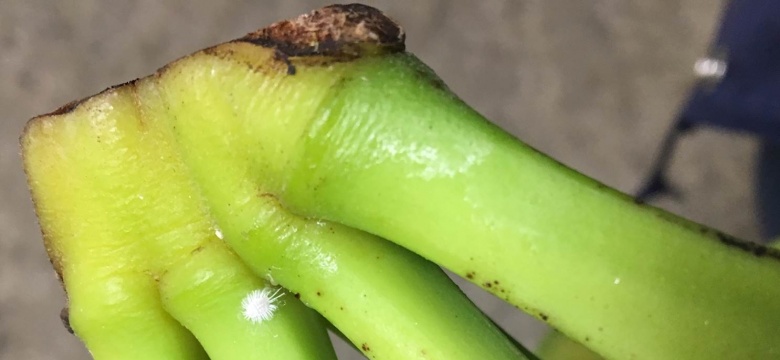Infested Banana Shipment Discovered

On Tuesday, November 13th, the Plant Protection Section at the Department of Environment and Natural Resources was alerted to a bunch of imported bananas that were infested with two pests, scale and mealybug. The Dole bananas originated in South and Central America and were shipped into Bermuda from US suppliers.
Inspections of distributors and grocery stores revealed that all imported bananas are infested with scale, mealybug or both. Infested fruit has been removed from the shelves of grocery stores and confiscated as a result of these insect pests. The number of live, mobile mealybugs found was alarmingly high and poses a serious risk to Bermuda’s banana industry, local crops and ornamental plants. The scale infestation was equally concerning as live scale and viable eggs were detected on all parts of the imported banana fruit.
Mealybugs and scale feed on the sap of crops and ornamental plants. Heavy feeding by these insects can cause tip growth distortion and death, as well as premature leaf and fruit drop. The insects’ feeding can also produce copious amounts of honeydew (a sweet exudate from the insect) which often leads to the growth of a black sooty mold (fungus) which can visually devalue fruits and vegetables. In addition, mealybugs and scale can also transmit various plant viruses which can deform the growing fruit and vegetables and reduce yield and stunt plants. Furthermore, mealybugs and scale are notoriously difficult to treat with pesticides as they both have waxy coverings which protect them from contact pesticides, and both pests naturally hide in crevices and cracks on the plant material, which makes it very difficult for the pesticide to reach and effectively control them.
The Department of Environment Natural Resources would like to issue a public advisory for customers who have recently purchased imported bananas. Composting of banana skins that harbor these insects will put the local banana industry at risk. Therefore, all banana skins should be disposed directly into garbage bags for trash collection. Do not compost or recycle recently purchased banana skins into the environment. Introducing these pests into the local environment could lead to their establishment on bananas and other locally grown crops and will result in the reduction of yield and crop quality. The establishment of these pests will necessitate increased pesticide use on local crops.
The Department of Environment and Natural Resources has contacted the US Department of Agriculture and the US suppliers of the bananas to advise them of this situation. They are requesting augmented pre-export inspections of banana shipments to minimize the risk of a recurrence. The Department would like to thank the public for their cooperation in protecting our environment.